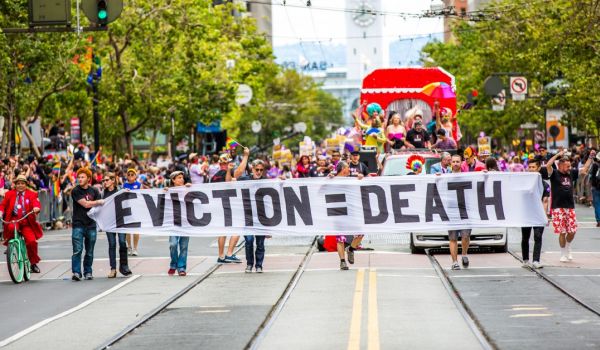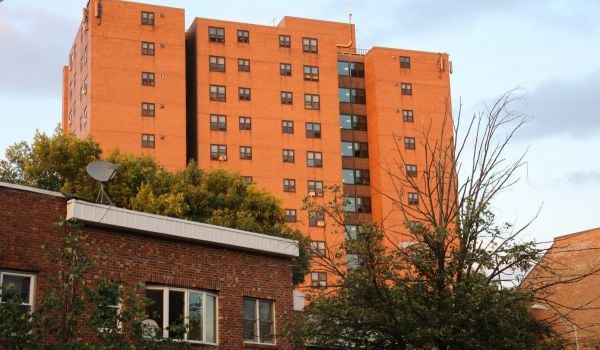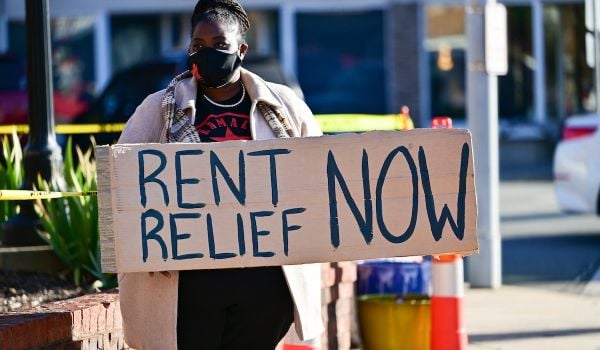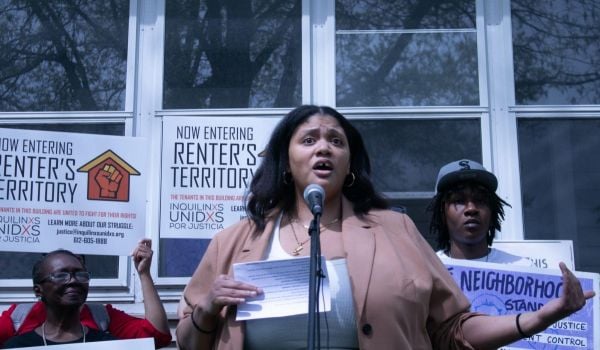Last year Jessica Barron, a Granite City, Illinois, woman, let a teenage friend of her oldest son stay in her family’s home for a few months during the winter when he had nowhere else to sleep. In May, that teenager allegedly burglarized a local bar. Police questioned Barron about his whereabouts, and she told them that she hadn’t seen him recently since he had stopped coming around as much once the weather had warmed. To Barron’s surprise, the suspect was at her house when she got home, so she asked her son to call the police and showed them to the teenager once they arrived.
Because of that incident, reported the right-leaning think tank Illinois Policy at the time, Barron and her family are being evicted from their home. Her landlord doesn’t want them to leave but is required to force them out, thanks to the city’s crime-free housing ordinance.
Sometimes known as nuisance property ordinances or simply nuisance ordinances, crime-free housing laws can take slightly different shapes, but in general, they require landlords to evict people who are involved with crime from their homes, often through a mandatory crime-free addendum added to lease agreements.
What constitutes a crime or a nuisance under these often broadly worded ordinances can range drastically, explains Emily Werth, a staff attorney at the ACLU of Illinois. Eviction-worthy violations can include everything from a certain number of police calls to a property in a given timeframe (even if the caller is a victim) to citations for not cutting grass to — as in Barron’s case — alleged crimes committed by houseguests. “They ultimately get at the same goal, which is getting rid of ‘undesirable’ tenants who are generating police calls,” Werth says, who began working on the topic in depth when she was at the Shriver Center, the Chicago-based organization which focuses on poverty law.
“Crime-free housing ordinances essentially started out as one-strike policies that were adopted in the ‘80s,” says Robert McNamara, a senior attorney at the libertarian Institute for Justice. Once a federal tool used to evict residents from public housing in the wake of the War on Drugs, similar laws have since metastasized in both the private realm in the form of voluntary programs as well as on state and city levels through ordinances like the one in Granite City. Today they can be found across the country, from 50 cities across the Twin Cities metro to California, where a non-profit specializing in and advocating for the enactment of such policies is located in El Cajon, a suburb of San Diego. They tend to be concentrated in the suburbs of major metro areas, but they’re by no means limited to those areas, Werth explains.
Not only do these ordinances require landlords to use and enforce crime-free policies, but landlords can be punished for not enforcing them in the form of everything from fines to the loss of rental licenses.
“There are a number of populations who are harmed by these ordinances like people who are experiencing domestic or sexual violence. They hold tenants responsible even if they’re the victim of that criminal activity,” Werth adds, noting the 2013 ACLU case of Lakisha Briggs in Pennsylvania.
Briggs was living in Norristown, Pennsylvania in 2013 when it had a crime-free housing ordinance. During that time, she had to call the police multiple times for protection from her abusive ex-boyfriend. She eventually became hesitant to call the police during future incidents — inducing one in which Briggs’ ex attacked her with a brick — for fear of eviction under the city’s ordinance that required it when police are called to a property more than three times in four months. Eventually Briggs’ neighbors called the police during an attack that required she be airlifted to a hospital for treatment. Briggs was subsequently threatened with eviction.
As in Briggs’ case, Werth points out that these ordinances are more commonly enforced in communities of color. Even when municipalities attempt to carve out exceptions for victims of crimes, they still end up ultimately failing victims since calls in response to issues like domestic violence can sometimes uncover other crimes, like drug possession or resisting arrest on the part of the perpetrator, which aren’t exempt from the ordinances.
“In addition to the examples of domestic and sexual violence, people with disabilities are often in need of assistance as are those who need to call the police for a mental health crisis,” Werth explains. “Everyone has a constitutional right to petition the government for assistance,” she says, which many of these ordinances run counter.
Werth’s ACLU chapter works to educate tenants of their rights and to convince municipalities to avoid them in the first place. Their approach with municipalities is to not only outline the harm that these ordinances can do to vulnerable populations, but to also educate about the liabilities they can expose cities to as a result of constitutional and civil rights violations. The result of broad efforts by the ACLU has led Savannah, Georgia, to suspend its crime-free housing program and a Missouri town to reform its nuisance law to include victim protections, police training, and more.
The Institute of Justice has brought a suit against Granite City, alleging constitutional violations. “The reaction I’ve gotten to this case is that [people] can’t believe this is happening,” McNamara says. Granite City couldn’t be reached for comment on this story.
“I think it’s part of a broader contempt that government officials have for renters,” he continues. “A lot of it is aimed at pushing landlords out as well. A lot of cities are hostile towards rental properties and their ‘less desirable’ occupants [compared to] owner occupants. Both sides of the transaction are being punished.”
Both McNamara and Werth see a continuing battle against these ordinances ahead. “This model is being actively exported and it’s unconstitutional, so I expect to see a lot of course challenges,” McNamara says.
This article is part of Backyard, a newsletter exploring scalable solutions to make housing fairer, more affordable and more environmentally sustainable. Subscribe to our weekly Backyard newsletter.

Cinnamon Janzer is a freelance journalist based in Minneapolis. Her work has appeared in National Geographic, U.S. News & World Report, Rewire.news, and more. She holds an MA in Social Design, with a specialization in intervention design, from the Maryland Institute College of Art and a BA in Cultural Anthropology and Fine Art from the University of Minnesota, Twin Cities.
Follow Cinnamon .(JavaScript must be enabled to view this email address)


















